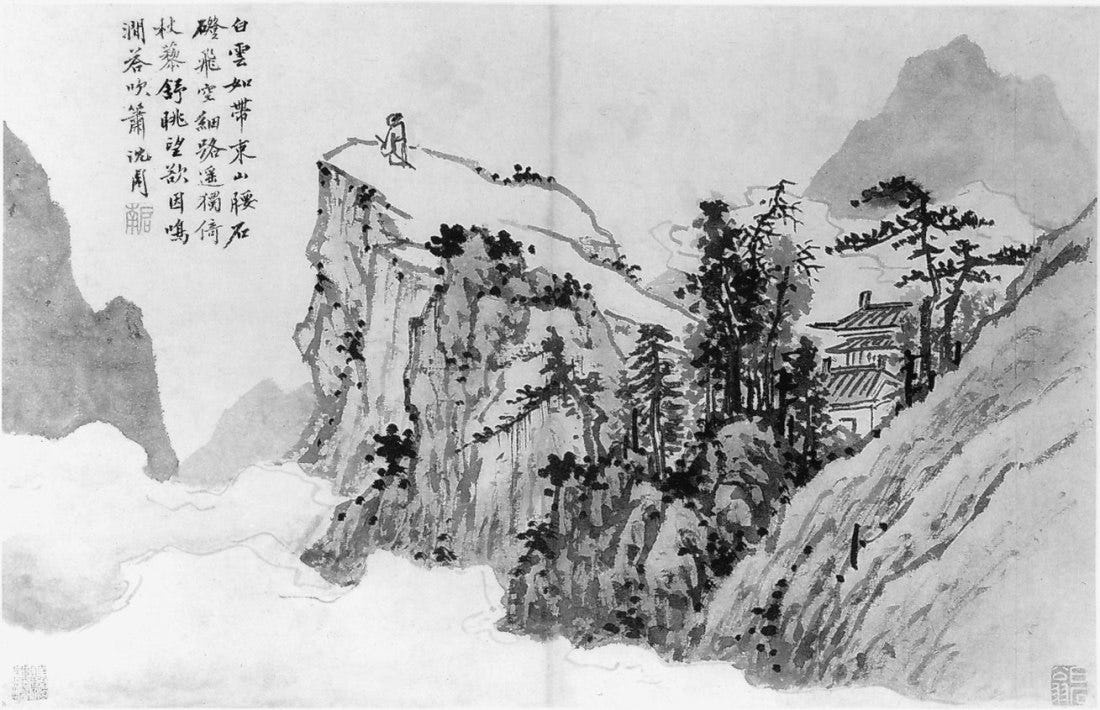
Many of us go through life trying to impose our will on the world. Sometimes it works — we finally get the promotion that we’ve been battling for, after endless late nights and newly-sprouted silver hairs; our animalistic efforts towards a female are rewarded with a wild, no-holds-barred evening in a hotel room, or our headstrong child finally gives in to our relentless requests to scrub the dishes. Often, it doesn’t work. Our snarling, snake-like manager takes all the credit for himself; the girl in the bar with the magnificent breasts sneers at our lowly attempts at flirtation, and our little-bastard-of-a-son blocks us with the noise-cancelling headphones that we paid for.
Life is — as fiery Italian footballer Gennaro Gattuso so eloquently puts it , is “sometimes maybe good, and sometimes maybe shit”. It’s the messiest thing we’ll encounter, an enormous, warping ball of the most twisted and wonderful nonsense we can hope to imagine, the taming of which is difficult for even the most skilled circus performer. The world will do what the hell it wants, regardless of our sweaty exertion.
Somewhere in the undulating, gorgeously-green slopes of Classical China, in an ancient time known as the Spring and Autumn period, an insightful, unknown character saw the world’s indifference with perfect clarity, and when combined with the idea that life is easier when you go with the flow, came up with the Taoist concept of wu wei.
Wu wei, when translated literally, means “without exertion”. It’s the idea that each of our actions should be performed spontaneously, based on the conditions of the moment. The staggering number of events that have led up to this moment in your life have created a set of conditions that are almost entirely outside of your control, and by acting in accordance with these inevitable conditions, you’re giving yourself the best chance of success, and not locking yourself into battle with an unbeatable world that, quite frankly, doesn’t give a shit about you.
“Life is a series of natural and spontaneous changes. Don’t resist them; that only creates sorrow. Let reality be reality. Let things flow naturally forward in whatever way they like.” — Lao Tzu
Wu wei can also often translated as non-action, which sounds like an advocation to be a lazy deadshit, but is actually the idea of being more effective when you’re not forcing a situation. We cannot hope to persistently control a world that is hell-bent on doing what it wants. Instead, we can take each situation as it comes, and act in accordance with the unique conditions of the circumstances. The alternative is a path to teeth-grinding frustration. The expectations that we bear, and the force that we use to impose them, are the source of much irritation and resentment.
“[Unrealistic] expectations are premeditated resentments.” — rumoured to have originated in 12-step programs
Swiss psychologist Jean Piaget discovered that kids roughly under the age of seven have a tendency to believe that they can affect the outcome of a situation simply by thinking it, as though the very thought of pushing your little brother off a revolving see-saw would actually cause it to happen. He named this magical thinking, which as adults, is exactly what we’re doing when we have unrealistic expectations. It doesn’t make a shred of difference whether we expect something to happen or not. Going with the flow — wu weistyle — is a much more favourable attitude.
“I do my thing and you do your thing.
I am not in this world to live up to your expectations,
And you are not in this world to live up to mine.
You are you, and I am I,
and if by chance we find each other, it’s beautiful.
If not, it can’t be helped.” — Fritz Perls, ‘Gestalt Therapy Verbatim,’ 1969
Wu wei is not a call for unbridled apathy, in which we float through the world like stoned spectres, drooling and desireless, but instead an invitation to let goof our expectations, taking each moment as it comes. It’s turning your boat around and paddling with the stream, rather than against it. So much energy is wasted in trying to mould the world into our desired shape, and while we do have some success, we’re often left frustrated. Though desire, ambition and action will remain as undeniable and important forces in our lives, we must accept that our plans will often be thwarted, and that instead of descending into despair, we might consider adapting to the developing situation in the spirit of wu wei, providing us with an effective and delightful buoyancy in which we no longer have to partake in fruitless battles against an unconquerable opponent.
“If you realize that all things change, there is nothing you will try to hold on to. If you are not afraid of dying, there is nothing you cannot achieve.” — Lao Tzu, Tao Te Ching
The concept of wu wei is similar to the Buddhist concept of Upādāna, which can be referred to as attachment, clinging, or grasping. When we become attached to our expectations, in our desire to dominate and regulate our world, we suffer. For the orange-clad, baritone-omming buddhist, the cessation of attachment leads to Nirvana — a liberation of the soul, similar to the feeling one might expect when you finally become free of worries, after a lifetime of carrying them. Timone and Pumbaa were probably buddhists.
Similarities to wu wei can also be seen in the Greek philosophy of Stoicism, which teaches the futility of trying to control that which cannot be controlled, as if the statement isn’t already obvious enough, and yet still dismally overlooked by so many us. The stoics believed that you should live according to your values, while preparing yourself for repeated, inevitable disappointment, because most of the time, the world doesn’t play to our rules.
“It is not the man who has too little that is poor, but the one who hankers after more.” — Seneca, Letters from a Stoic
To be a practitioner of wu wei is to bestow yourself with additional energy, usually wasted on combative, headstrong styles of thinking. You’re no longer paddling against the stream, but using its natural energy to propel yourself forward, and in the process, enhancing your own vitality. Once the unnecessary need to fight has been expelled, you can move forward with increased finesse and competency, towards a brighter, less quarrelsome future.
The East has much to teach us, with Taoism a worthy forerunner. Wu wei, and it’s emphasis on going with the flow, must surely be one of the most liberating ideas to emerge from that mysterious continent, encompassing the ability to relieve a great deal of mental stress, and move forward with an accepting, permissible attitude, in which the hardships of life are efficiently dealt with.
Hooray for wu wei!
Originally published at antidotesforchimps.com on February 23, 2019.

Recent Comments